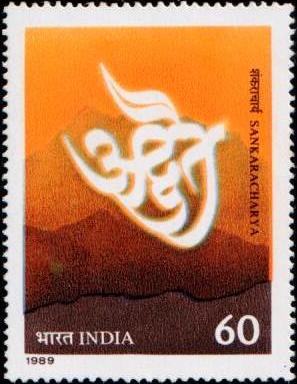
Sankaracharya
A commemorative postage stamp on the Adi Shankara (Shankaracharya), an 8th century Indian philosopher and theologian, doctrine of Advaita Vedanta :
 Issued by India
Issued by India
Issued on May 17, 1989
Description of Designs : The stamp has been designed by India Security Press Nashik Road on the basis of design supplied by Shri R. K. Joshi, I.I.T. Bombay through the Department of Culture. The stamp depicts the word “Advaita” in stylised Devanagari Script. The First Day Cover is also based on the material supplied by the same Department. The cancellation has been designed by Nenu Gupta.
Type : Stamp, Mint Condition
Colour : Multicolour
Denomination : 60 Paise
Overall size : 4.80 x 3.60 cms.
Printing size : 4.35 x 3.15 cms.
Perforation : 13 x 13
Paper : Imported unwatermarked adhesive gravure coated stamp paper
Number Printed : 15,00,000
Number per issue sheet : 20
Printing Process : Photogravure
Printed : India Security Press
Name : Shankara
Born on 788 CE at Kaladi [now Kochi, Kerala, India]
Died on 820 CE at Kedarnath [now Uttarakhand, India]
About :
- Sankaracharya exercised a deep influence on Indian thought, intellect and spiritual life. The impact of his intellect and spiritual knowledge on Indian philosophy, poetry, science, metaphysics, ethics and humanism is evident even today. Distinguishing transcendental knowledge from empirical knowledge, he asserted that the religion and the essence of scriptures are concerned only with the former. Apart from his philosophical teachings, Sankaracharya popularised Sanskrit by singing and writing it in a simple way as praised by Sister Nivedita in the following words, “to have written poems whose grandeur makes him unmistakable even to foreign and unlearned ears and at the same time to have lived with his disciples, in all the radiant love and simple pathos of the saints – this is the greatest that we must appreciate but cannot understand.”
- Sri Sankara was born in Kaladi village in Kerala in 788. Sankara mastered the four Vedas and became an ascetic even at an early age. Travelling all over India by foot, he propagated a unifying spiritual outlook among all people through discussions and debate. Sankara re-established Advaita and systematised it. To him, ‘Jeevathma’ and ‘Paramathma’ are the same, one and indivisible. He attempted to reconcile conflicting religious sects, reject undesirable practices considered to be religious and fight empty ritualism. To quote Pandit Jawaharlal Nehru in his Discovery of India, “he was a curious mixture of a philosopher and a scholar, an agnostic and mystic, a poet and a saint, and in addition to all this, a practical reformer and an able organiser.”
- Sankaracharya never claimed for himself any kind of originality for his teachings. His originality was in reinterpreting the great Indian traditions.
- Text: Based on material supplied by Department of Culture.


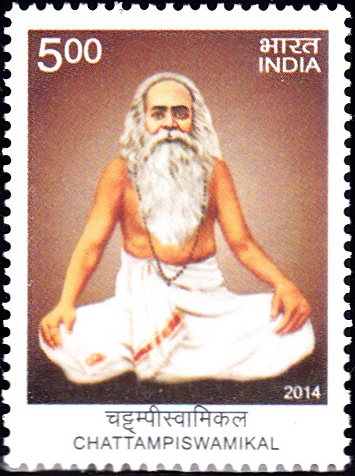
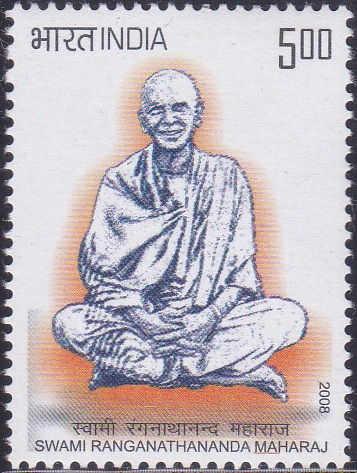
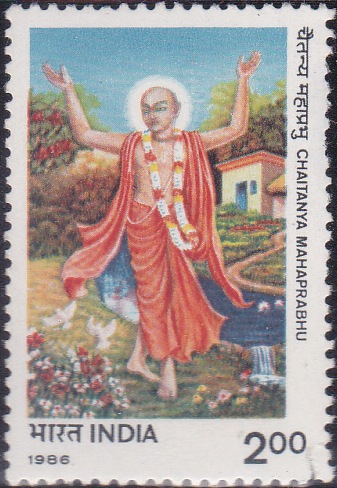
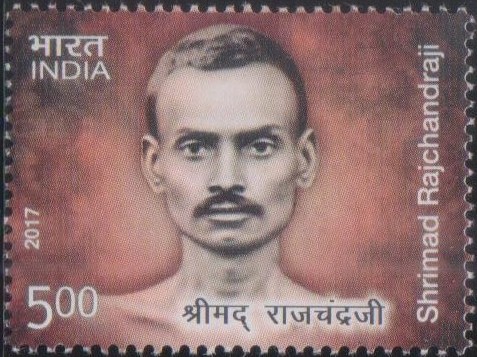
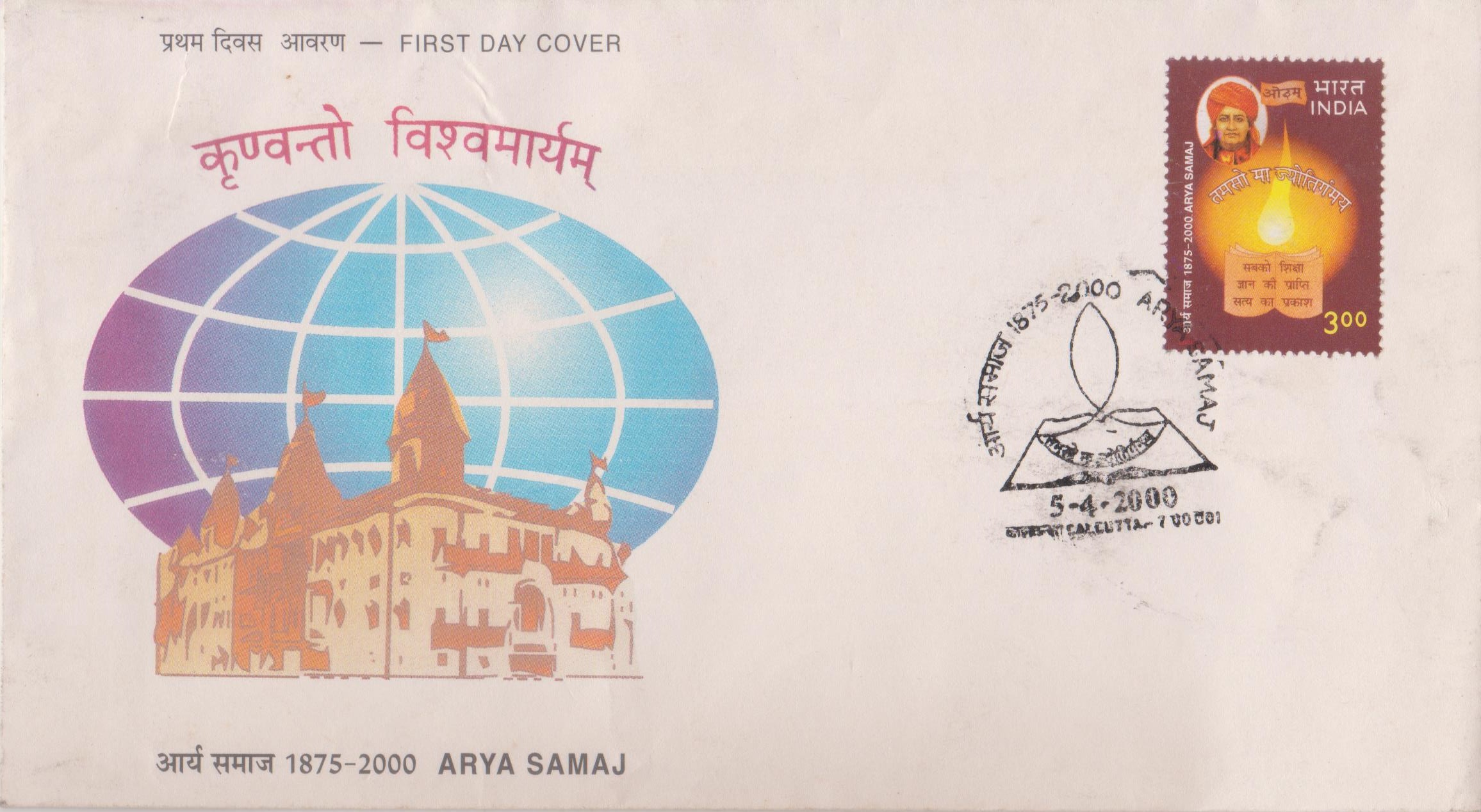
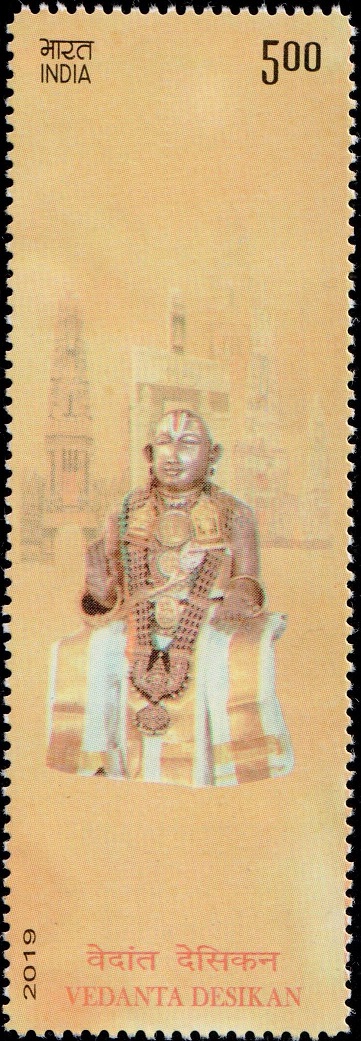
Hello istampgallery.com owner, Good work!
[…] Vishal Badri Temple, dedicated to Lord Badrinath by Adi Sankaracharya, lies in a picturesque Himalayan valley of Garhwal. The hot mineral spring of Badrinath is renowned […]
[…] 1908 in Khed, a small village near Pune, Maharashtra. At a young age, Rajguru was mesmerized with Jagatguru Shankaracharya’s brilliance and eloquence and became his ardent follower. He was also inspired by Lokmanya Bal […]
[…] origin of Kumbh Mela was transcribed by the 8th-century philosopher Shankara. The term ‘Kumbh’ comes from the root ‘kumbhak’ (the sacred pitcher of elixir of […]
[…] 130 commentaries and about 25,000 stanzas in poetry. He particularly wrote on the Advait Vedanta of Shri Sankaracharya and Shri Dnyaneshwar Maharaj. He liked the holy songs (Bhajans), holy verses (Shlokas) and reading […]
[…] ‘Bhakti‘. His next phase of life was that of a vedantist under the inspiration of the Jagadguru Shankaracharya of Dwarka Matha. He started devoting himself to self-contemplation, prayer and […]